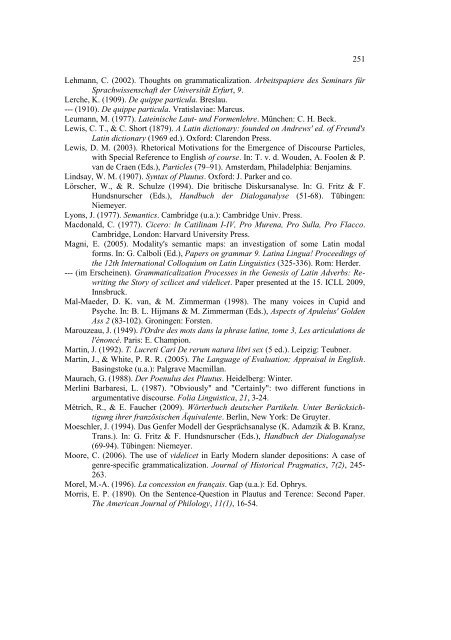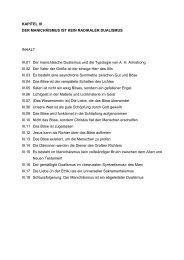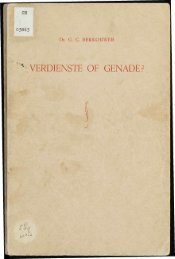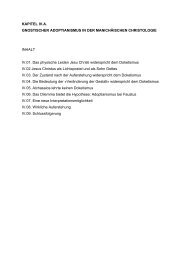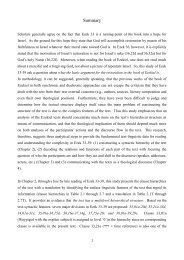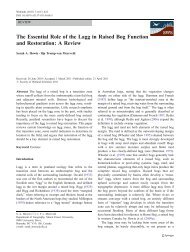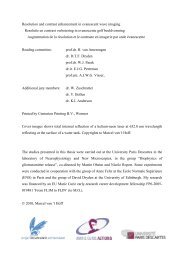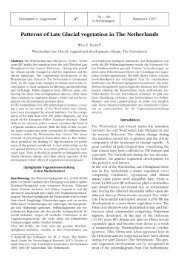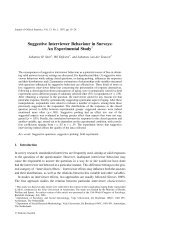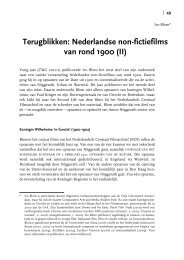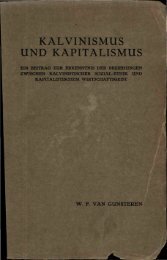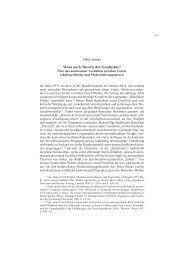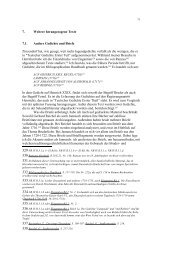Lateinische epistemische Partikeln - VU-DARE Home - Vrije ...
Lateinische epistemische Partikeln - VU-DARE Home - Vrije ...
Lateinische epistemische Partikeln - VU-DARE Home - Vrije ...
Sie wollen auch ein ePaper? Erhöhen Sie die Reichweite Ihrer Titel.
YUMPU macht aus Druck-PDFs automatisch weboptimierte ePaper, die Google liebt.
251<br />
Lehmann, C. (2002). Thoughts on grammaticalization. Arbeitspapiere des Seminars für<br />
Sprachwissenschaft der Universität Erfurt, 9.<br />
Lerche, K. (1909). De quippe particula. Breslau.<br />
--- (1910). De quippe particula. Vratislaviae: Marcus.<br />
Leumann, M. (1977). <strong>Lateinische</strong> Laut- und Formenlehre. München: C. H. Beck.<br />
Lewis, C. T., & C. Short (1879). A Latin dictionary: founded on Andrews' ed. of Freund's<br />
Latin dictionary (1969 ed.). Oxford: Clarendon Press.<br />
Lewis, D. M. (2003). Rhetorical Motivations for the Emergence of Discourse Particles,<br />
with Special Reference to English of course. In: T. v. d. Wouden, A. Foolen & P.<br />
van de Craen (Eds.), Particles (79–91). Amsterdam, Philadelphia: Benjamins.<br />
Lindsay, W. M. (1907). Syntax of Plautus. Oxford: J. Parker and co.<br />
Lörscher, W., & R. Schulze (1994). Die britische Diskursanalyse. In: G. Fritz & F.<br />
Hundsnurscher (Eds.), Handbuch der Dialoganalyse (51-68). Tübingen:<br />
Niemeyer.<br />
Lyons, J. (1977). Semantics. Cambridge (u.a.): Cambridge Univ. Press.<br />
Macdonald, C. (1977). Cicero: In Catilinam I-IV, Pro Murena, Pro Sulla, Pro Flacco.<br />
Cambridge, London: Harvard University Press.<br />
Magni, E. (2005). Modality's semantic maps: an investigation of some Latin modal<br />
forms. In: G. Calboli (Ed.), Papers on grammar 9. Latina Lingua! Proceedings of<br />
the 12th International Colloquium on Latin Linguistics (325-336). Rom: Herder.<br />
--- (im Erscheinen). Grammaticalization Processes in the Genesis of Latin Adverbs: Rewriting<br />
the Story of scilicet and videlicet. Paper presented at the 15. ICLL 2009,<br />
Innsbruck.<br />
Mal-Maeder, D. K. van, & M. Zimmerman (1998). The many voices in Cupid and<br />
Psyche. In: B. L. Hijmans & M. Zimmerman (Eds.), Aspects of Apuleius' Golden<br />
Ass 2 (83-102). Groningen: Forsten.<br />
Marouzeau, J. (1949). l'Ordre des mots dans la phrase latine, tome 3, Les articulations de<br />
l'énoncé. Paris: E. Champion.<br />
Martin, J. (1992). T. Lucreti Cari De rerum natura libri sex (5 ed.). Leipzig: Teubner.<br />
Martin, J., & White, P. R. R. (2005). The Language of Evaluation; Appraisal in English.<br />
Basingstoke (u.a.): Palgrave Macmillan.<br />
Maurach, G. (1988). Der Poenulus des Plautus. Heidelberg: Winter.<br />
Merlini Barbaresi, L. (1987). "Obviously" and "Certainly": two different functions in<br />
argumentative discourse. Folia Linguistica, 21, 3-24.<br />
Métrich, R., & E. Faucher (2009). Wörterbuch deutscher <strong>Partikeln</strong>. Unter Berücksichtigung<br />
ihrer französischen Äquivalente. Berlin, New York: De Gruyter.<br />
Moeschler, J. (1994). Das Genfer Modell der Gesprächsanalyse (K. Adamzik & B. Kranz,<br />
Trans.). In: G. Fritz & F. Hundsnurscher (Eds.), Handbuch der Dialoganalyse<br />
(69-94). Tübingen: Niemeyer.<br />
Moore, C. (2006). The use of videlicet in Early Modern slander depositions: A case of<br />
genre-specific grammaticalization. Journal of Historical Pragmatics, 7(2), 245-<br />
263.<br />
Morel, M.-A. (1996). La concession en français. Gap (u.a.): Ed. Ophrys.<br />
Morris, E. P. (1890). On the Sentence-Question in Plautus and Terence: Second Paper.<br />
The American Journal of Philology, 11(1), 16-54.


